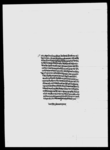A letter by Kesara Siṃ Rāu re dowry given to the daughter of Śyāma Siṃ (VS 1893)
ID: DNA_0001_0024
Edited and
translated by Axel Michaels
in collaboration with
Manik Bajracharya and Rajan Khatiwoda
Created: 2015-07-08;
Last modified: 2018-06-14
For the metadata of the document, click here
The accompanying edition, translation/synopsis and/or commentary are available under the terms of the Creative Commons Attribution-ShareAlike 4.0 International License
Abstract
This letter, written by Kesara Siṃ Rāu, a Nepalese envoy to Ambara City, to the respective authority contains a report about King Raṇajita Siṃ.Diplomatic edition
[1r]
1⟪नं२४⟫1हाति६चाँदिकाहौदासमेत्कार्चुपिझुल्•घोडाकोरथ१वएल्कोरथ१कार्चु2पिकामगर्याका१०१घोडालाईचादिकाहैकल्•जतिरकम्कपरा•उतिरकम्एक
3सयेएक्जतिभाडादियासुनकाफिक्दानिसमेत्सुनकादिया•योसवरक
4म्हाथिसमेत्•आफ्नाहवेलिदेषि•वाहिर•फिजिदियाचारैतर्फसिपाहिरा
5षिदियाघोडाप्रभृतिसववाहिराष्यार•दुनिञाँलाईदेषायाफेरिनौनि
6हालसिंलाईभन्यायोसवकार्षानामैलेहजुरलाईचह्रायाँभन्या•नौनि
7हालसिंलेआफ्नामानिसलाईउठाउभन्यार•स्याम्सिंलेभन्यादिनतमैलेह
8जुरलाईचह्राँञाँ•तररणजितसिंलेनदेषिनउठाउ•भन्या•उठाउनदियेन
9न्•फेरि•रंजितसिंरलाठसाप्•सगसवारिभैसर्दार•स्याम्सिंलेदिइ
10मालघटिभरहातिथामि•रंजितसिंलेलाठलाईदेषाया•लाठलेदेष्यार
11मुषमा•अडंलोहालिलाठगयो•तसअर्थ•स्याम्सिंकोवहुत्•वडांईभयो
12सवैलेआचर्यमान्याएतिकोदौलथदियारछोरिलाई•नाल्किमाचह्रा
13ई•अनमाईदियोरनौनिहालसिंतिनैरानिलाईलिअम्वरसहरफिर्यारंजि
14तसिंप्रभृतिसवसर्दारहरूरफिरंगिलाहूर•उतैवाट• गया•मपनिअर्ज्जिले
15षनानिमित्तअम्वर•सहरफिरि•आया•अवलाहूरजान्छुफिरिंगिकोवि
16दाईहेर्नवाँकिसवविस्तारचरणमाआईगरूला•मैलेचाडै•आउनपर्छकि२।४मैह्ना
17वस्नुजोआज्ञाआउछसोगरूलाजानाजानमाफविंति•ईतिसम्वत्१८९३सालमि
18तिफागुणशुदिरोज७मोकामअम्वरसहरआलुवालेकेकटरे•शुभम्¯¯¯¯¯¯
19केसरसिंराउकोसलाम्सतम्•
Translation
[1r]
No. 24
As rental fee for the cost of 6 elephants together with silver elephant seats howdahs, an embroidered (kārcupi for kārcopī) cover, 1 horse chariot, 1 bull chariot, silver ornamentation for 101 horses fitted out with embroidered work was given one hundred one [rupees]. Even a golden spittoon was given. All these kinds [of things i.e. ornaments etc.] together with the elephants were displayed outside [his] own enclosed mansion (haveli). Soldiers were stationed in all four directions. Horses etc. were all kept at the same place and displayed to ordinary people. Again, Naunihāla Siṃ was told: "All these crafts I offered to Your [Majesty]." Naunihāla Siṃ ordered his people to carry them away, [but] Syām Siṃ did not allow them to do so, saying: "As for giving, it was I who gave [these things] to Your [Majesty], but don't carry them away until Raṇajita Siṃ has seen them." Again, when [the king] Raṇajita (text: Raṃjita) Siṃ together with the Lāṭha Sāheba (text: lāṭha sāhap) arrived, halting his elephant for a while, he pointed out to the Lāṭha Sāheba the things [supposedly] given by Syām Siṃ. The Lāṭha Sāheba saw them, put his finger into his mouth [in astonishment] and went on. That is why Syāṃ Siṃ was highly praised. Everyone was astonished. This much property was given [as a dowry], and [his] daughter was taken ceremonial leave of and set on a palanquin, and Naunihāla Siṃ returned to Ambara city1 with her as queen. All the sardāras including Raṇajit Siṃ and the British went to Lahore. I, too, have returned to Ambara city in order to write [this] arjī. Now I will go to Lahore to observe the departures of the British. I will report you the remaining [details] after reaching you on foot. Shall I come quickly or stay 2-4 months? I shall do as [you] order. I request [your] pardon for any conscious or unconscious [mistake].
Saturday, the 5th of the bright fortnight of Phālguṇa of of the [Vikrama] era year 1893 (1837 CE) from the residence [in] Ambara city, Āluvaleke Kaṭare. [Let it be] auspicious.
Hundredfold salutations from Kesara Siṃ Rāu.
Commentary
This document has been published (Bajracharya/Khatiwoda/Michaels 2015: 100-101).

